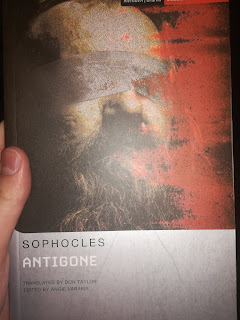TOK Journal Entry 4: Analysing how knowledge is communicated in Antigone - Writing Wednesday
Hello everybody and welcome back to another blog post,
Take a look at TOK journal entry 4! Enjoy!
How do we communicate the same knowledge effectively?
Last term in English lessons, we’ve been reading, studying, and thinking about the text and play of Antigone. Antigone is a play written by the Ancient Greek tragic play writer, Sophocles, around the years 440 and 441 BC. Antigone is about the aftermath of the civil war against Eteocles and Polyneices, the two sons of Oedipus, the previous king of Thebes. When the two sons kill each other Creon, who is next in line to the throne, succeeds the two sons and during the beginning of his rule, he leaves Polyneices’s body to the vultures as he had betrayed the kingdom by going against Eteocles. The whole drama of the play begins when Antigone betrays the law of Creon, by giving her brother Polyneices, a proper religious burial.
However, the play is not just interesting for its story and historical context, but also for its interpretations. Having been written in the language of Ancient Greece, even the most knowledgeable and experienced of translators, came up with very different versions of the story. Upon hearing that we were going to be analysing the constructs of the play, I ordered my own version of Antigone that I deemed to be the correct version of the story. It was translated by Don Taylor and was written for a BBC TV production of the Theban Plays in 1986, of which Don Taylor also directed. However, when it arrived, I realised that the language in the book was very simplistic in comparison to other versions that tried to be strict in the accuracy of translation. I thought that this was because Don Taylor had wanted to create a version of this epic play that would be easy for a modern-day audience watching on the TV, to understand. After looking at some other versions of Antigone in class, there were other interesting versions. Jean Anouilh, who was influenced by the Nazi occupation of France, in his version of Antigone, he made his characters purposefully ambiguous with Antigone revolting against the authority and Creon (as ambiguous Hitler) supporting the brutality. Historical context can influence some writer’s decisions when it comes to translating ancient texts. Additionally, in class, in order to understand the play, we watched the drama version of the play created by the National Theatre and directed by Polly Findlay. Clearly, Findlay was influenced by modern perspectives of authoritarian states by setting her version of Antigone in a World War Two-style war room.
In conclusion, judging by these interpretations, there is no right way to disseminate the same knowledge. It can be confusing sometimes to the audience to have so many different versions of the same play, but writers are affected by the historical climate they live in. I just find it interesting to observe from an outside perspective because as a modern reader or a modern audience, I can learn so much about past events by looking in on all the writers’ viewpoints. In this sense, there is something in terms of knowledge, to be gained by analysing these different interpretations of Antigone.
What are some of your examples of different communication of knowledge? Let me know in the comments below and I'll be sure to reply to them. I ♡ hearing from you!
Tap one of the reaction boxes below to let me know what you thought of this post. It would really help me to make some improvements in the future!
Be sure to follow and subscribe so that you don't miss any more of my brilliant posts and share this article with a friend who might enjoy it too!
See you next time,
Bye,
XOX, Juliette

Comments
Post a Comment
Thanks for leaving your comments! I really enjoy reading your positive and constructive messages. They really make my day! 💜